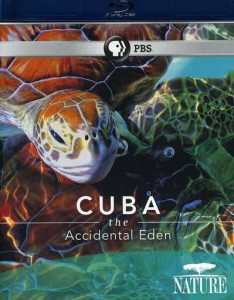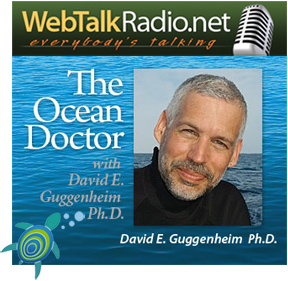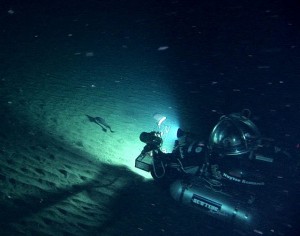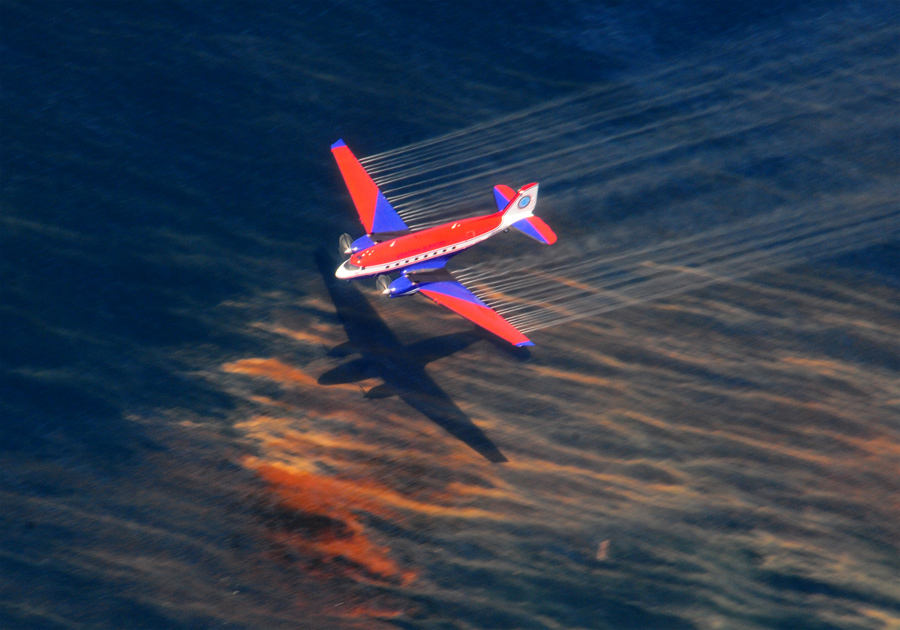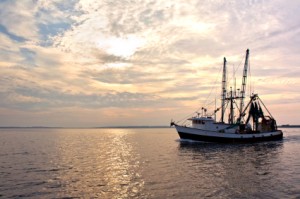
Chemical dispersants being released near Houma, Louisiana in the Gulf of Mexico (USCG photo)
PETITION: Millions of gallons of the dispersant, Corexit, have been released into the Gulf of Mexico in order to disperse the massive oil spill caused by the explosion and sinking of the BP Deepwater Horizon. The rationale behind the use of the dispersant is to keep oil from the sensitive wetlands and coastlines. However, by dispersing the oil throughout the water column, this practice is making it impossible to recover the dispersed oil at the surface while plumes of the dispersed oil remain at depth, entering the food chain at many levels where it will bioaccumulate as it moves up the food chain. Dispersing the oil means more of it will likely travel with prevailing currents to destinations downstream, including Cuba, Mexico, the Florida Keys, and the eastern seaboard of the United States.
|
|
 |
|
Hear the interview with marine toxicologist, Dr. Susan Shaw about chemical dispersants and their impact on the Gulf’s wildlife and human health
|
|
Corexit is one of the most toxic dispersants and one of the least effective on Louisiana crude oil. However, it is the mixture of Corexit and oil that represents an even greater threat as the toxic effects are magnified. Corexit, designed to break down lipid layers, facilitates the movement of toxic materials across the membranes of wildlife and human beings. The dispersant-oil mixture is killing marine wildlife, including dolphins, whales and fish, while also causing a range of serious human health effects to those who have been exposed.
We, the undersigned, believe that the continued widespread use of dispersants, especially Corexit, represents an unprecedented, large-scale uncontrolled experiment on the Gulf of Mexico with potentially grave, decades-long consequences to the marine ecosystems and Gulf communities. We therefore call upon the Obama Administration, including the U.S. Environmental Protection Agency, to immediately halt the use of chemical dispersants in the Gulf of Mexico.
THANK YOU for signing the petition!
The petition is now closed, but roughly 1,200 of you signed this petition and shared your outrage. Together we will help prevent such a reckless action from happening ever again.
Here are the names and comments of just a few that signed the petition:
This is devastating horrifc news about the cover up of the third oil well leaking and the use of the toxic chemical dispersants used. This is nothing short of biological warfare harming human, ocean, plant and animal life for decades to come.
Helen Wilson, FL,
Ninian Williams, WA,
Not only do we know that chemical dispersants are dangerous to marine and wildlife, but humans as well; we also have safe and effective bioremediation products that are EPA-approved such as “oil digester” which can eliminate the need for both harmful chemicals as well as artificial mechanical devices which cannot safely clean sensitive areas such as estuaries and marshland. Please support us as a safe alternative to toxic and wasted chemical dispersants being used around the world.
www.bioremediationinc.com I proudly show my bias because I know we can win this fight against deadly hydrocarbon release in our waterways.
deanna munson, deamun1967@gmail.com, deamun1967@gmail.com
Karsten Moeller, Niedersachsen, Germany
matt brinck, nc,
corrupt old cronies in govt allowed the killing of mother nature for money
xxxxxxxx, la,
you want to kill? then come do it man to man. bunch of greedy punks
Karen Hayne, Florida,
Please stop dispersing poison in the Gulf of Mexico. It is affecting many people & killing our marine life animals. The situation will take many years to correct. Don’t contribute more poisoning to the ecosystems which may end of being irreversible.
xxxxxxxx, Florida,
brannon gore, ohio,
shane, al,
Do you guys have any advice for skin lesion releif , from corexit desperant – I have been absolutley miserable for almost a year now with skin rashes and lepracy like lesions …
Atholl Fraser, Fife, Scotland
Mary Taylor, Fl,
Katja Toivola, LA,
Betty Harbison, Florida,
I live in central Florida, the continued dangers of the gulf illegal spraying should not be ignored.
diane fleischman, wash,
god bless us all
alison byers, FL,
We have fled the area with all of us diagnosed with chemical pnuemonia and high level of VOC’s in our blood!!! It may be too late such karge amunts have already been released in to the water and atmosphere!!! Horrible!
Carolyn Howland, Al, United States
Paul Ringo, Louisiana,
Janice, FL,
I lived on the gulf during and after and I have become sick from it. Stop now.
jeremy, tx,
Noelle Soren, AZ,
cherie day, az,
please stop the application of toxic dispersants to the gulf of mexico. they are causing far reaching health issues and death.
Lindsay Vega, La,
Molly Calcagno, Oregon,
xxxxxxxx, Florida,
This needs to stop!No more “dispersants”!!
xxxxxxxx, fl,
I didn’t want to believe this was really happening, now I am deathly sick, with no medical options locally.
Linda McIntyre, Alberta,
Also the weather modification and chemtrail poisoning needs to STOP.
xxxxxxxx, ,
Please stop the use of Corexit NOW!
Brian Stevens, Ontario,
desmond garza, ok,
i hope we are not too late
xxxxxxxx, Or.,
I wont waste my breath telling you how dangerous and wrong this is, you have known it all along. God has promised that he will ‘deal’ with those who destroy the Earth. You stupid evil bastards don’t have a clue what is in store for you.
Dolores Peers, Florida,
Mackenzie BrI have hundreds of mysterious unhealing burning itching sores all over my body, my thyro, AL`,
I have hundreds of mysterious unhealing burning itching sores all over my body, my thyroid has just disintegrated, i have polysystic ovarie dusease and was told my ability to have children is highly unlikely, and several other medical issues. They have started since the oil spill but the major skin lesions started in the beginning of November 2010. After research, Alabama was under a chemtrail warning for Octomer 29, 2010. I am 28 years old. PLEASE PLEASE PLEASE stop! You are killing us!
Lori Bosarge, AL,
Living with EPA,Coast Guard,NOAA and our elected officials who were all put in place to protect us from our enemies has let this country down. They have aloud greed of industrial power to take command over our country. What kind of human being thinks it’s okay to spray toxic chemicals on other human beings? Our little coastal community was quiet and peaceful. Not only did the gov. allow BP to pollute our waters, but also our land and air. If you think these toxin stops here, they don’t. They will continue to spread and contaminate our country. Dispersants, Corexit must not be used for any reason. Our coastal communities are suffering from symptoms of toxic exposure and can no longer be used as lab rats. Please keep this conversation alive with your local media and organizations. There are more of US citizens than there are of them. We do have rights and we need to step up and use our voices and work together to have this vile chemical band in this country. Thank you to all that support this petition.this petition.
Theresa Goins, Al,
Please stop the dispersants, it is making us really sick down here
Jacqui, MA,
there has been enough damage to the ocean, stop putting more toxic substances in it, your greed is killing the planet!
Jacqui Lattenstein, NT, Australia
We do not own this planet, we are the care takers for our future generations, “care takers”. Please stop this toxocide of our childrens planet. This madness is effecting everything from our weather to birds, fish and humans. This is criminally insane behavior!!!!
Ruby Linda hunter, BC,
We have to stop poisoning our planet, we must treat it with loving care or it won’t be here to provide for us much longer….poison is poison and nothing can manifest itself as good unless it is good.They say history repeats itself…well we make history so if we don’t want bad repition we must change for the better for all! There is a saying..”if you don’t eat, you don’t shit, if you don’t shit you die”! We cannot eat poison and live….so we must start caring for our planet, our garden!
Bill Connerty, Illinois, usa
xxxxxxxx, Worcestershire, UK
Obvious ecological warfare.
gerard ciccone, ny,
i don’t know why our government officials pretend that they are too busy to notice the horrible crimes that they themselves are a part of.
Richard Tuma, , Czech Republic
xxxxxxxx, NY,
xxxxxxxx, oregon,
Please stop the madness in the gulf. Stop all use of dispersants in the Gulf. We owe that to the rest of the world and next generation of humans who will be affected by the current carrying this mess to waters elsewhere on the planet.
Doug Pearson, Nayarit,
Stop Killing our planet you greedy pigs!
xxxxxxxx, WA,
Please stop the madness in the gulf. 2 wrongs don’t make a right, they just kill more life. Stop all use of dispersants in the Gulf. We owe that to the rest of the world who will be affected by the current carrying this mess to waters elsewhere on the planet.
Tammy Cromer-Campbell, TX, USA
On 11/21/10 I was in Grand Isle, LA. I saw a boat that appeared to be a large white container with Corexit on the boat…
Kathleen Escalera, Cochabamba, Bolivia
jennifer harper, ny,
Only an oil company could make a disaster of this magnitude WORSE! The spraying of dispersants should be illegal, there was no hearing or considerations given before BP took it upon themselves to inflict more harm on this planet. This is an outrage! We are all to be held responsible for each day this outrage continues. With knowledge comes responsibility.
xxxxxxxx, , Portugal
Aleksander Lindemann, Slovenia, SI
xxxxxxxx, ,
Janine Boer, CA,
Sharon, Missouri,
Enough is enough! Stop putting more poison into the waters of the gulf. You are creating a condition of a malignant cancer that can spread to all waters of the earth. All are connected. Stop this insanity.
Angela Marks, Alabama,
Matthew Moriarty, VA,
It is evident the sprayers will not stop polluting the Gulf unless forced to do so. We delude ourselves by believing there is a political or legal solution to this problem, since the politicians and the Courts are protecting the sprayers. In short the US government itself has proven its culpability in the poisoning of the Gulf. Millions of sick people will soon know their government has abandoned them. We must all ask: who is the enemy now?
aaron meckling, alberta,
thank you for being our voice
sonya roberts, Essex, UK
I am so deeply sorry for what these victims are suffering and appalled that this has been allowed to happen. It was totally avoidable and unnecessary. The use of the chemical dispersant has to stop now, because it is murder.
Glenda Newsom, FL,
Our own government is killing all on the Gulf Coast. They knew Corexit was outlawed in England and other countries and they knew what it would do to us and the environment but all they could think of was the dollar signs. BP refused to not use it because Nalco is their company and they make corexit. Thad Allen was suppose to be able to overrule BP and he wouldn’t do it, probably because the President wouldn’t let him. I am so angry and hurt over them ruining our beautiful beaches and our marine life that put so many families out of the fishing business and now they are wondering where their next meal for their children is coming from. They need to take BP and put them all on a island far away and spray them good with corexit every single day.
xxxxxxxx, Ontario,
There is a coming judgement for those who think that they are getting away with this.
Jessica Mecellem, Il,
Anandi Premlall, New York, United States
Dispersants are no good for us or the ocean, please stop now!
Annette Ochs, Berlin, Germany
Lynn Sarch, New York,
no more spraying, people are sick.They are killing the air,and the water,and everything.Enough already with the spraying.Crops,people,wildlife, jobs.
Stop this spraying now.
Gail Abbott, CT,
Gary Sisco, Kentucky,
Ellen Powell, VT,
I have seen the videos and photographs. Oh my God! Stop this dispersant madness immediately!
Brian Friesen, CA,
Lynn Thelen, MI,
connie olsen, pa,
AMERICANS BETTER WAKE UP to a government which finds some citizens expendable. VOTE on Nov. 2 for constitutional candidates!
Dolly Sue, Florida,
The users of this chemical Corexit are murderers without a concience! I demand you ban it, Sec. 5-5a of the Feb 11,1994 Executive Order; Federal Actions To Address Environmental Justice In Minority Populations And Low-Income Populations!
Robin Ritter, C,
kerry Firkin, NSW, Australia
Please you must stop this chemical spraying it is not good for the enviroment or the people who live in gulf thay have been through enough already
xxxxxxxx, FL,
Philip Restino, FL,
Stop the spraying now ! American people need to turn off their television sets and wake up. Our “trusted friends” on TV have been lying to us and misleading us for years. Remember to always follow the money and consider who is signing your favorite “trusted friend” TV talking head’s paycheck. Support alternative media and your local community businesses.
Janice, Florida,
We have been sprayed for years with chemicals and
now this new corexit plus other ingredients are
harming people in the Gulf and all along the Atlantic Ocean. If this is genocide, the people responsible are not going to have much of a land or ocean left for themselves. They might find themselves sickened and have a sickened ocean and land once people are lost by genocide. How SICK ARE YOU PEOPLE ANYWAY?????
Art Rosch, CA, USA
gemma, wa,
Paul Grimm, Ohio,
Carol Hiltner, Washington,
xxxxxxxx, la,
Leah Mae Macrohon, , Philippines
Find another alternative to this disaster..you can’t put off fire with fire..
Carsten Rasmussen, , Denmark
jackie stemen, tx,
criminal actions by our government and big corporation to what end I wonder?
Patrick Prichard, Floirda,
xxxxxxxx, florida,
I live in Freeport Just East of Destin and feel I have been affected healthwise due to the spill/dispersant. Including respiratory,rashes, and severe eye symptoms. My boyfriend lives in Pensacola and he is also having symptoms, and we believe they are still spraying in Pensacola, many unexplained very latenight flights.
xxxxxxxx, ,
THEY NEED TO STOP IT, BEFORE IT’S TOO LATE
George Myers, New York,
Once “Better Living Through Chemistry” was its proud motto. Now it has become it’s shame, using dispersants will and do harm. If worked in cleanup for EPA, they should stop this, as they have other contaminants.
D. Thomas, Florida,
TWO WRONGS DO NOT MAKE A RIGHT!!!!!
Dispersants make the oil IMPOSSIBLE to collect. The dispersant merely spreads the oil throughout the water column- hidden but worse than before. BP/Corexit experiment failed! Talk about Volatile Organic Compounds – natural, yet toxic oil + BP’s toxic corexit = a Gulf full of poison. We now have sick water, sick ocean, sick fish, sick air and sick people.
NEVER AGAIN ALLOW THE USE OF DISPERSANT- NEVER!!!
michelledesroche, mississippi,
I have lived on the Mississippi Gulf Coast my whole life. I am Deeply concerned for my health, as well as those of my family, friends, and the wildlife. Please STOP the Use of Chemical Dispersants in the Gulf of Mexico NOW!!!
ehanno, france, france
la nature doit reprendre ses droits
xxxxxxxx, mi,
Joan De Witt, Florida,
xxxxxxxx, MT,
Jane nye, IL, usa
Hard to believe this would be an issue. It should never have been allowed in the first place. The only reason I can see using it is to hide the oil, lessoning The ammt. BP pays for fouling our magnificent Gulf.It is poison, as is written in the description & warnings in its paperwork from the lab that makes it. How was something of that nature even allowed to be put into a living place like the Gulf, with its people, birds & marine life. Once it is destroyed, its gone. Stop. Stop. Stop. I am afraid its too late already.
Kera Mcclung, Texas,

